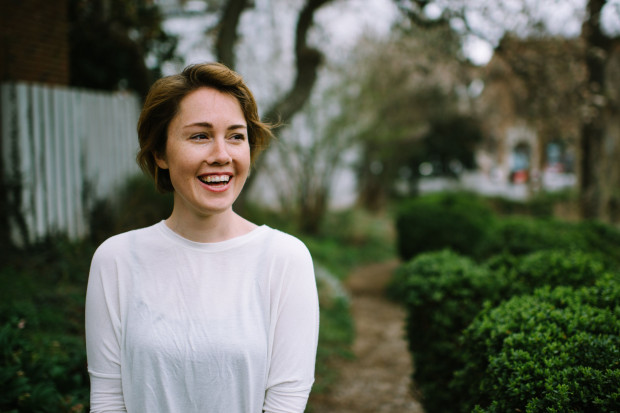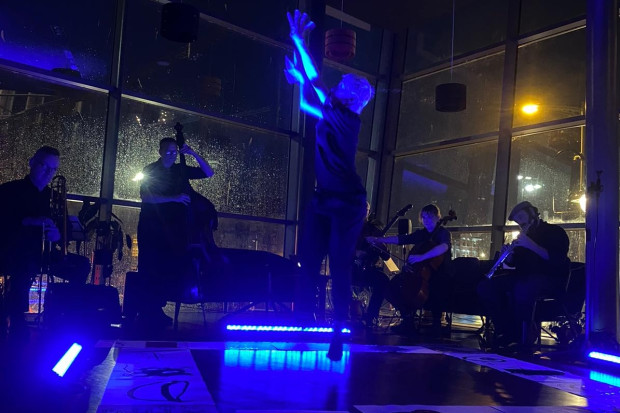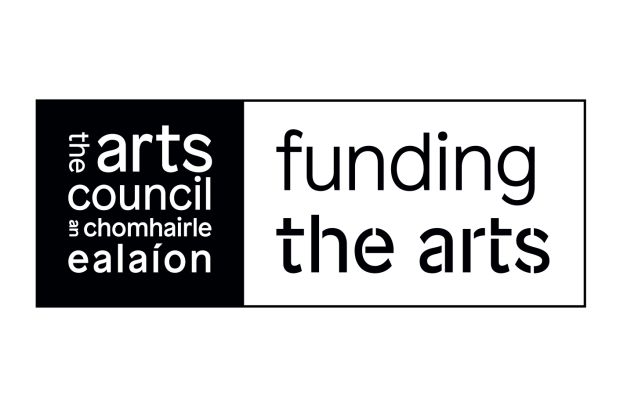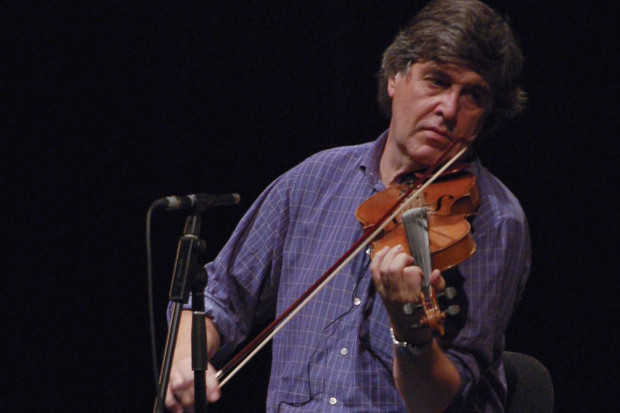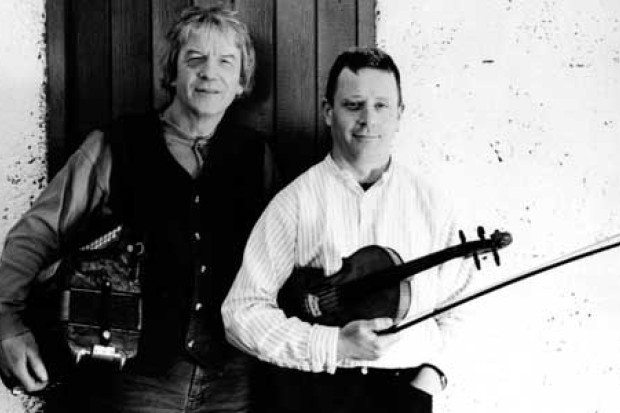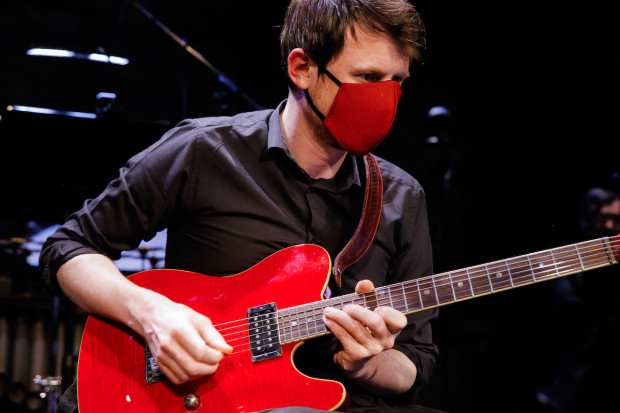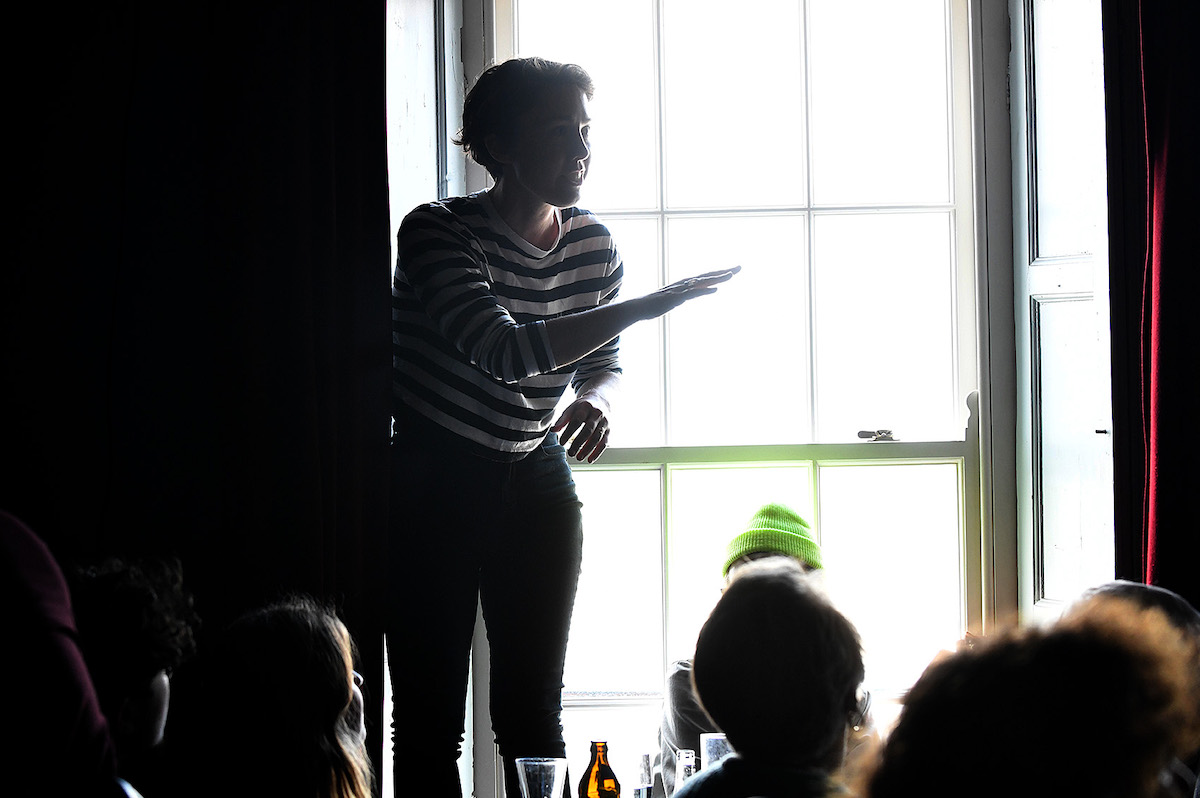
Composer Caroline Shaw introducing her programme at the Spirit Store in Dundalk as part of the Louth Contemporary Music Festival (Photo: Ken Finegan, Newspics Photography)
Embracing the Louth Spirit
My first experience of Louth Contemporary Music Festival was in 2007, walking alone in the graveyard behind St Peter’s church in Drogheda and bumping into the composer Terry Riley. He evidently had been, like me, seeking a little quiet before the performance. It’s the sort of experience I’ve since come to find emblematic of the festival, as the unassuming (and seemingly, from some of the conversations I’ve had with locals, often oblivious) town is visited by artists who change lives.
I missed that year’s performance of Riley’s landmark In C, but sixteen years later it closed the festival again. Louth Contemporary Music Society, led by Artistic Director Eamonn Quinn, seems aware of its past – the festival opens with a new work by Linda Catlin Smith, whose 2019 commission Meadow has seen some international success – even as it looks to the future, seeing the first visit to Ireland of the American composer Caroline Shaw.
The opening concert, performed by Chamber Choir Ireland at St Nicholas’ Church, featured three works – two of them new commissions – by female composers. (It’s worth mentioning that Louth Contemporary Music Festival has achieved near gender parity in its featured composers in recent years.) Smith’s Folio draws on writings by Emily Dickinson, giving them a gentle, ritualistic feel. The music has a steady momentum, built from long notes and consonant intervals, with the occasional sweet cluster. It’s very thoughtful choral writing as well, almost like a chamber symphony in how it shares the work between the singers.
Cassandra Miller’s The City, Full Of People closed the concert, splitting the choir into small groups positioned throughout the church. Each group seems to sing alone, facing inwards. Of all the work performed at the festival, this one most emphasised the subjectivity of the listener – my experience, a metre away from three of the men, was surely quite different from those at the centre of the church, where two of the women singers walked back and forth.
Audiences interested in the technical and challenging will have most enjoyed the second and third concerts. Clara Iannotta’s A Failed Entertainment and Dead Wasps in the Jam-Jar (III) are tightly-compressed works in which Explore Ensemble – a string quartet with electronics – pushed the limits of sound, both through extraordinary quiet at times and a panoply of techniques – bowing a polystyrene block; scratchy, unpitched crescendi; lead mutes. The group brought extraordinary skill to these challenging and intricate works.
Likewise the Sigma Project, the saxophone quartet, played a retrospective of their 15-year career with dazzling technique, from rapid passages to multiphonics and gentle, ghostly subtones. Jesús Torres’ Tenebrae takes Renaissance responsories as a starting point, and his music blends impressively smoothly with the older work. José María Sánchez-Verdú’s Khôra Cycle explores delicate interactions in changing sonority. The Basque composer Helga Arias’ Milk Spilt on a Stone begins with a rich, sonorous chord before evaporating down to quiet air, the quartet removing their reeds and blowing through their instruments, while Graciela Paraskevaídis’ 2008 Alibi examines a four-note motif from every conceivable angle.

The Sigma Project (Photo: Ken Finegan, Newspics Photography)
Collective trauma
Composer Sam Perkin feels keenly, and speaks passionately about, the collective trauma following Covid, particularly the harm it’s caused to the careers of young artists. He saw his 2021 work Visualization as a ritual return to live performance, though ironically its premiere was a video broadcast by the Galway string orchestra Luminosa. His new work, Awe, repurposes that video, layering it with new music for string quartet performed by Explore Ensemble at the Oriel Centre. Perkin’s sparse style lends itself to this sort of additive recomposition, as the live and recorded groups interact and each seems to introduce new ideas carried by the other. Visualization had been intended as a sort of bath of sound in which the listener was immersed, but was flattened by video performance. Awe, in re-examining that material, opens the space up again.
With five concerts in two days, and four new works, this year’s festival felt both compact and expansive. Laurence Crane’s new second string quartet could be described in the same terms. The three-movement work builds, as does much of his music, on simple, meditative ideas. Here the music holds the strong implication of chords V and I in a major key, setting up a fascinating contradiction: those chords form the backbone of the narrative thrust of much Western music; they imply motion, but keep almost perfectly still.

The Explore Ensemble (Photo: Eamonn Quinn)
Shaw in the Spirit Store
‘It’s too hard to get to the stage right now,’ Caroline Shaw told the packed Spirit Store, instead clambering onto a windowsill to introduce her quartet, Evergreen, describing it as a gift to a dead, moss-covered tree. It is delicate, evocative music. In the second half of the concert, she performed (from the stage!) several of her own songs (mostly those from the Evergreen album by Shaw and the Attacca quartet) with accompaniment from Esposito. These songs are sincere and emotive, drawing as much on pop and American folk as on the classical tradition.
But Shaw writes best for choir. Her five-movement How To Fold The Wind, written for Chamber Choir Ireland in 2020 and performed by them at the first concert, brings the delight and playfulness that have become her hallmarks. Like her Pulitzer-winning Partita for Eight Voices, it begins by pulling music apparently from thin air, folding the wind (as it were) and giving it form. The fourth movement, built on vowel sounds (the others had words by Shaw), was especially striking, with the women’s voices rolling open and shut ‘o’ sounds, a fluctuating timbral backdrop.

Caroline Shaw and the Esposito Quartet (Photo: Ken Finegan, Newspics Photography)
Results not rules
To the best of my knowledge, Terry Riley did not appear around any graveyard corners in Dundalk this time, but this festival again featured In C, performed in a sold-out concert at St Nicholas’ by traditional Irish musicians Zoë Conway and Paddy Glackin on fiddles, Louise and Michelle Mulcahy on flute and harp, Mick O’Brien on uileann pipes and whistle, Máirtín O’Connor on accordion and Dónal Lunny taking the central pulse on bouzouki.
This wasn’t by any means a classical performance by traditional musicians. The notes were (mostly) Riley’s, but the approach – the way they were decorated or harmonised or even touched – was Irish. In C is built on a set of 53 repeated cells that the performers move through as a group, though each individual chooses when to move on or stay. It was around cell 11 that the performance really started to find its energy, as the music moves into mostly semiquavers and Lunny began to vamp chords.
It’s likely that this unconventional approach to In C took inspiration from the extraordinary 2014 recording by Malian musicians for Africa Express. Throughout, the performers made space for quiet, often enchanting moments where most instruments would drop out, leaving just two or three – bouzouki and harp, say, or fiddle and flute. Hints of the ending could be felt at several points, the cells taking on the pulse of a jig, say, but it was with Glackin’s impassioned interpolation of the air ‘Gol na mBan san Ár’, the final solo, that the dam burst; from here the music charged forward, ending not with In C’s usual meditative diminishment, but with a vibrant reel. As Riley said of the Africa Express version, ‘Rules are not as important as results.’
There is a vitality to the work Louth Contemporary Music Society does, a way their festival folds its past successes together with bold new choices. It’s a joy that brings an audience at the Spirit Store to hum a B-flat tone under Caroline Shaw’s artistic paean to the creative process, Other Song, or compels members of The Sigma Project to dance in the audience to an Irish reel. It’s an embrace of musicality and community and continuity. It’s the impulse to ask, as Dónal Lunny did at the end of the 50-minute performance of In C, ‘Will we play it again?’
Visit www.louthcms.org.

Performance of ‘In C’ at St Nicholas’ church (Photo: Ken Finegan, Newspics Photography)
Published on 22 June 2023
Brendan Finan is a teacher and writer. Visit www.brendanfinan.net.










